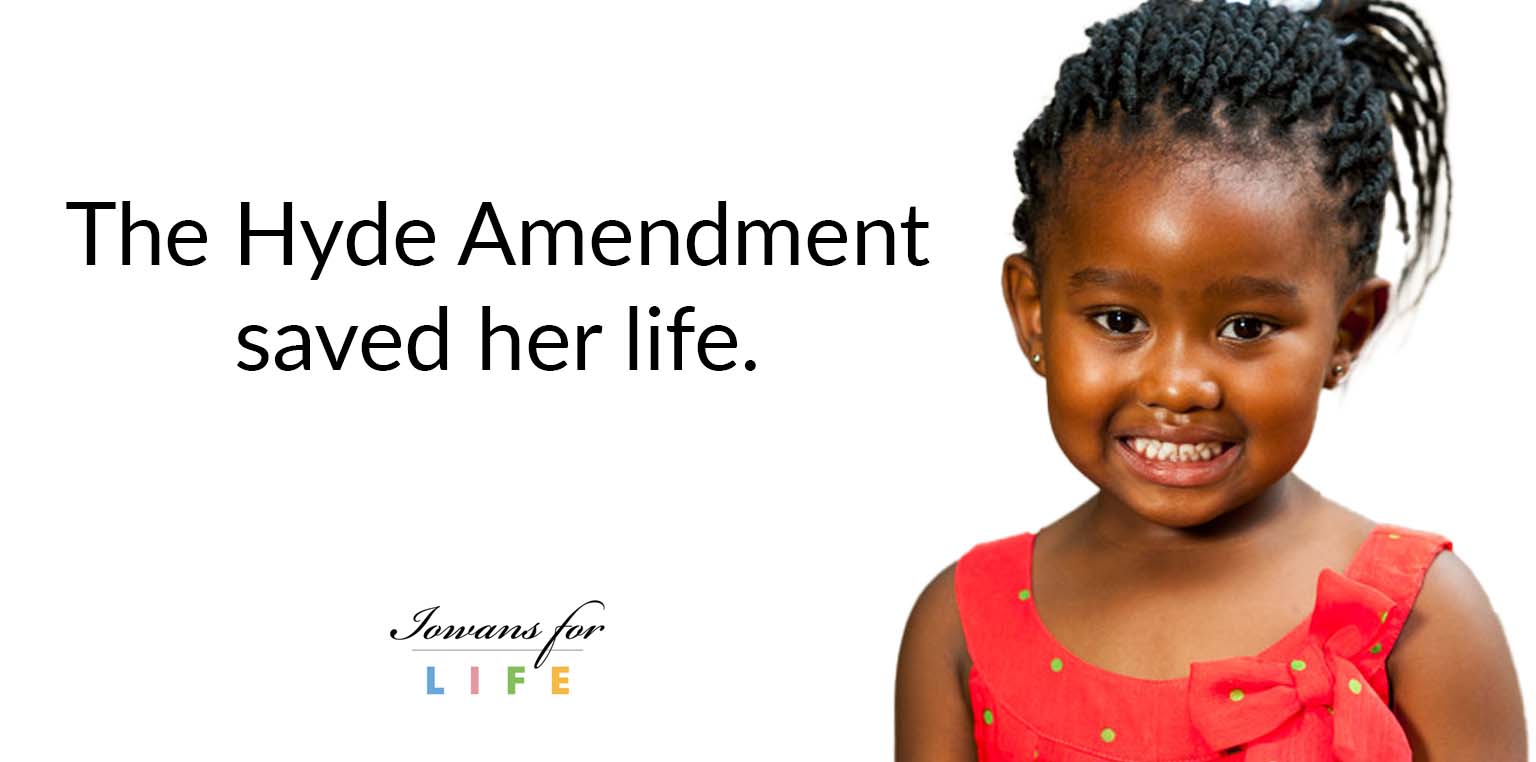The racist underpinnings of banning the Hyde Amendment
 The Hyde Amendment is in the news. President Biden calls for ending it in his new budget proposal even though he supported it throughout his many years in the Senate. Iowans for LIFE supports the Hyde Amendment because it quantifiably reduces the incidence of abortion, especially within minority populations. Let’s take a quick look:
The Hyde Amendment is in the news. President Biden calls for ending it in his new budget proposal even though he supported it throughout his many years in the Senate. Iowans for LIFE supports the Hyde Amendment because it quantifiably reduces the incidence of abortion, especially within minority populations. Let’s take a quick look:
First of all, what does the Hyde Amendment do? It bars the use of federal funds to pay for abortions. The Amendment is actually a rider to appropriation bills and must be renewed each year by Congress.
How long has it been in effect? Since 1976.
Does it work? Yes. According to the Charlotte Lozier Institute, “the best research indicates that the Hyde Amendment has saved over two million unborn children” since 1976. The American Civil Liberties Union said with the implementation of the Hyde Amendment, Medicaid abortions immediately dropped from 300,000 per year to a few thousand.
Do abortion advocates agree? Yes. The Guttmacher Institute says their own studies show that if a state does NOT fund Medicaid abortions, the abortion rate for women on Medicaid is 1.6 times that of women who aren’t. However, when states do fund Medicaid abortions, the rate increases to 4 times that of women not on Medicaid. These results are consistent with other public policy: when you subsidize something, you get more of it.
Abortion advocates claim the Hyde Amendment is discriminatory. Is this true? It is a matter of perspective. Yes, Hyde discriminates against women of color in the view of many abortion rights advocates. This is the view of Kathryn Kolbert, lawyer and co-founder of the Center for Reproductive Rights, and Julie F. Kay, a human rights attorney. Together, they authored, “Controlling Women: What We Must Do Now to Save Reproductive Freedom.” They wrote in the L.A. Times:
“A disproportionate number of those affected by the funding ban each year are women of color: Twenty-nine percent of Black women and 25% of Hispanic women of reproductive age were enrolled in Medicaid as of 2019, compared with just 15% of white women. The lack of funding uses the government’s power of the purse to put abortion out of reach for Medicaid recipients while still fully funding childbirth.”
So how can Hyde not be discriminatory? Using Ms. Kolbert’s and Kay’s numbers, you can see that a disproportionate number of Black and Hispanic babies will be saved thanks to restrictions on federally-funded abortions. Both groups have birth rates below replacement level, according to Statista. Preventing these racial groups from dying off due to abortion-driven extinction is a noble goal of any caring society that values diversity, tolerance, and inclusion.
So are you saying a Hyde Amendment ban is racist? We know that if Hyde ends, Black and Hispanic abortions will spike. The late Supreme Court Justice, Ruth Bader Ginsberg, acknowledged the racist underpinnings of the abortion movement in a 2009 interview with the New York Times Magazine:
“Frankly I had thought that at the time Roe was decided, there was concern about population growth and particularly growth in populations that we don’t want to have too many of. So that Roe was going to be then set up for Medicaid funding of abortion.”
Is there any evidence to support Ginsberg’s concern that Roe v Wade was motivated at least in part by racism, to reduce “growth in populations that we don’t want to have too many of”? Yes. One of the attorneys, Ron Weddington, who successfully argued Roe v Wade admitted as much in a letter he wrote to then-president Bill Clinton in 1993:
“I don’t think you are going to go very far in reforming the country until we have a better educated, healthier, wealthier population…. Start immediately to eliminate the barely educated, unhealthy and poor segment of our country [through abortion]…. There, I’ve said it. It’s what we all know is true, but we only whisper it, because as liberals who believe in individual rights, we view any program which might treat the disadvantaged differently as discriminatory, mean-spirited and…well…so Republican. Our survival depends upon our developing a population where everyone contributes. We don’t need more cannon fodder. We don’t need more parishioners. We don’t need more cheap labor. We don’t need more poor babies.”
If President Biden is successful in getting Congress to abolish the Hyde Amendment, the result is predictable: a sudden, sharp increase in the number of black and brown babies who are aborted accompanied by a faster decline in African-American and Hispanic birth rates. What could be more ‘systemically’ racist than public policy that compels white taxpayers to fund black and brown abortions?
